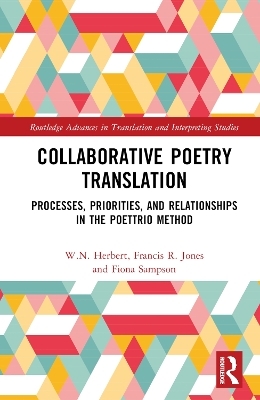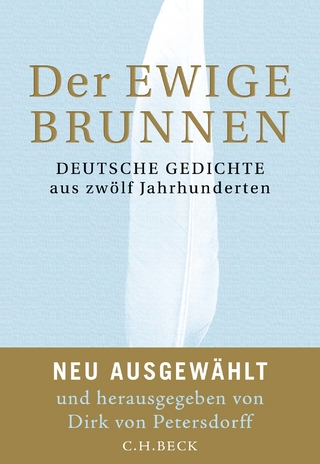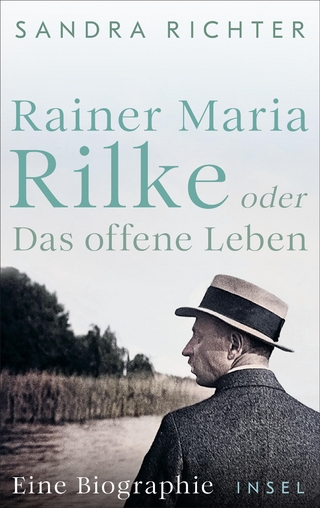
Collaborative Poetry Translation
Routledge (Verlag)
978-0-367-14118-9 (ISBN)
This volume provides an account of collaborative poetry translation in practice. The book focuses on the 'poettrio' method as a case study. This process brings together the source-language poet, the target-language poet, and a language advisor serving as a bilingual mediator between the two.
Drawing on data from over 100 hours of recorded footage and interviews, Collaborative Poetry Translation offers both qualitative and quantitative analyses of the method in practice, exploring such issues as poem selection, translation strategies, interaction between participants, and the balancing act between the different cultures at play. A final chapter highlights both the practical and research implications for practices of collaborative translation. This innovative work is situated in an interdisciplinary framework of collaborative translation, poetry translation, poetry and creative writing, and it addresses concerns ranging from the ethnography of collaboration to contemporary publishing practice.
It will be of interest to students, scholars, and specialists in translation studies, comparative literature, literary studies, and creative writing, as well as creative practitioners.
W.N. Herbert is Professor of Poetry and Creative Writing at the School of English Literature, Language and Linguistics at Newcastle University, UK. Francis R. Jones is Emeritus Professor of Translation Studies, Newcastle University, UK, and a translator of poetry. Fiona Sampson MBE FRSL is a widely translated writer, poet and critic, and Emeritus Professor of Poetry at the University of Roehampton, UK.
Contents
List of figuresList of tablesAcknowledgements
Chapter 1 Introduction
1.1 About this book
1.2 Translating poetry
1.3 Collaborative poetry translation
1.4 Researching collaborative poetry translation
1.5 Questions and hypotheses
Chapter 2 Poetry co-translation and the involvement of poets: some history
Chapter 3 Methodology: setting up the Poettrio Lab
3.1 Introduction
3.2 Methodology of the Poettrio
3.3 Issues arising within the Poettrio Lab due to methodology or design
Chapter 4 Processes, priorities, and shifts
4.1 Introduction
4.2 Selecting poems
4.3 Translation processes
4.4 Translation principles
4.5 Translation priorities
Chapter 5 Translation issues, positions, and solutions
5.1 Introduction
5.2 Sound versus sense
5.3 Creative moments
5.4 Third space of the translation
5.5 Normative and non-normative language
Chapter 6 Roles and Relationships
6.1 Introduction
6.2 The workshop as ecosystem
6.3 Organising
6.4 Roles
6.5 Relationships and communication
6.6 Dialogue and collaboration
6.7 Collaborative teams
Chapter 7 Conclusion
7.1 Introduction
7.2 Creative and professional outcomes
7.3 Modelling collaborative poetry translation
7.4 Wider implications
7.5 Recommendations
7.6 Envoi
Index
| Erscheinungsdatum | 10.07.2024 |
|---|---|
| Reihe/Serie | Routledge Advances in Translation and Interpreting Studies |
| Zusatzinfo | 7 Tables, black and white; 8 Line drawings, black and white; 8 Illustrations, black and white |
| Verlagsort | London |
| Sprache | englisch |
| Maße | 152 x 229 mm |
| Gewicht | 453 g |
| Themenwelt | Literatur ► Lyrik / Dramatik ► Lyrik / Gedichte |
| Geisteswissenschaften ► Sprach- / Literaturwissenschaft ► Anglistik / Amerikanistik | |
| Geisteswissenschaften ► Sprach- / Literaturwissenschaft ► Literaturwissenschaft | |
| Geisteswissenschaften ► Sprach- / Literaturwissenschaft ► Sprachwissenschaft | |
| ISBN-10 | 0-367-14118-3 / 0367141183 |
| ISBN-13 | 978-0-367-14118-9 / 9780367141189 |
| Zustand | Neuware |
| Informationen gemäß Produktsicherheitsverordnung (GPSR) | |
| Haben Sie eine Frage zum Produkt? |
aus dem Bereich


